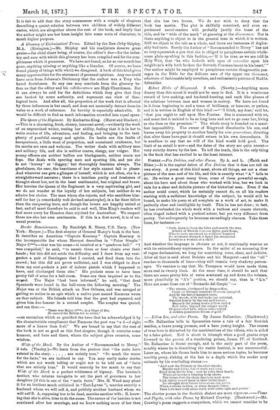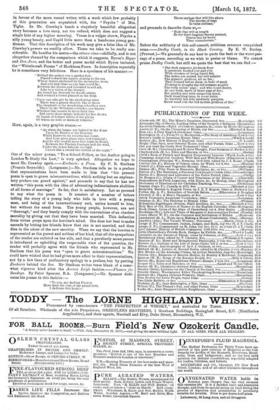Poster.—Fra Dolcino, and other Poems. By A. and L. (Smith
and Elder.)—It is the capital defect of Fra Dolcino that it does not tell its own story. A poem of this kind must, above all things, set out a clear picture of the man and of his life, and this is exactly what "A" fails to do. He writes a great many lines, some of them powerful enough, about his hero and about those who worked with him, but we look in vain for a clear and definite picture of the historical man. Even if the author could count, which he certainly cannot do, on all his readers starting with a sufficient knowledge of the subject, he would still be bound, to make his poem at all complete as a work of art, to make it perfectly clear and intelligible by itself. This he has not done ; in fact, he has overloaded the whole work with a verbose and ornate rhetoric, often tinged indeed with a poetical colour, but yet very different from poetry. Not unfrequently he becomes exceedingly obscure. Take these lines, for instance :- " Such, keen to burn the false and search the true,
Arnold of Brescia rose,—a fierce, pare flame, Who to stem manhood no self love beguiled No weakness warped, a heart yet reconciled Lovely as a woman or a child."
And whether the language is obscure or not, it continually wearies as with its extraordinary copiousness. In the midst of an unceasing flow of vague declamation, we long for something terse, clear, and definite. After all that is said about Dolcino and his Margaret—and the " all " reaches to thousands of lines—they still remain very shadowy person- ages. We venture to say that Mr. Tennyson would have made them more real in twenty lines. At the name time, it should be said that there are some pretty bits of verse scattered up and down the volume, more plentifully in "A's " portion, we should say, than in " L's." Here are some lines out of "Bernardo del Carpio " :— " The stream, o'erdanced by dragon-flies, Crept on through meadows blossom-spangled, And by the heron-haunted trees.
The woods, with leaf-buds just unfurled, Swelled hourly by the sun and breeze ; Beneath the young fern's yellow curled Soft tufts; beyond the steeper world Of gorse-clad bills, whose sides unfold A. sudden passionate bloom of gold."
—Lilias Lee, and other Poems. By James Ballantine. (Blackwood.) —Mr. Ballantine tells in Spenserian verse a tale of a fair Scottish maiden, a brave young yeoman, and a base young knight. The coarse of true love is disturbed by the machinations of the villain, who is aided by a false priest. Evil is about to triumph when a good genius steps forward in the person of a wandering prince, James IV. of Scotland. Mr. Ballantine is fluent enough, and in the early part of the poem, notably where he is describing the rustic festival, is not mnsuccessful. Later on, where his theme leads him to more serious topics, he becomes terribly prosy, sinking at the last to a depth which the reader may estimate by his concluding stanza :— " And now the Primate at the altar stands;
Randal and Lilies, full of truth and love, Bend them before him ; now he joins their hands, While all invoke a blessing from above.
The lovers feel the chain that love bath wove Link lightly round them in their bridal hour; Its strength their future lives alone can prove. When sorrows sadden, or when dangers lower,
Then love and truth shine forth with treble light and power."
The shorter poems in the Scottish dialect are more vigorous.— Venus and Psyche, with other Poems, by Richard Crawley. (Blackwood.)—Mr. Crawley's poem suggests a comparison, which we cannot consider to be in favour of the more recent writer, with a work which few probably of this generation are acquainted with, the " Psyche " of Mrs. Tighe. In Mr. Crawley's hands a singularly beautiful allegorical story becomes a love story, not too refined, which does not auggest a single hint of any higher meaning. Venus is a vulgar shrew, Psyche a silly young beauty, and Cupid little more than a handsome young gen- tleman. That this description of his work may give a false idea of Mr. Crawley's powers we readily allow. These we take to be really con- siderable. He handles his metre—the ottava rima—skilfully, and is not altogether shamed by the comparison which it suggests, Byron's Beppo and Don Juan, and the better and purer model which Byron imitated, the " Whistlecraft Poems" of Hookham Frere. In description especially he is sometimes very felicitous. Here is a specimen of his manner:—
" Behind the palace ran a garden fair, Placed toward the sunset, eloping to the sea Whose waters sheltered by the mountains were, And still and clear as any lake could be; Between the shores and bosomed in soft air, Like to a vision of the fantasy,
An island lay, beneath its woods asleep, And seemed a forest planted in the deep.
"Upon one side girt by the shadowing trees There was a grassy theatre, like to those The shepherd or the wandering schoolboy sees There in the Wiltshire solitudes, nor knows Whether that nature in those fairy leas Did carve these mimic hollows for her shows, Or hands of former tillers of the plains Of whom no note or memory remains."
ilere, again, is a very graphic stanza:— " As when the lamps are lighted in the dome Upon St. Peter's at the Festival,
When Easter to its eateries has come, And Lent gives place nuto uew Carnival ; And he who stands upon that night in Rome, Between the Pincian fountain and the wall, Under the ilexes beholds the light Cleave like a sword the curtain of the night."
One of the minor poems, "To a School-Fellow, or the Author going to London to Study the Law," is very spirited. Altogether we hope to meet Mr. Crawley again.—Eucharis: a Poem. By F. R. Statham (Francis Reynolds). (Longmans.)—Mr. Statham tells us in a preface that representations have been made to him that "his present poem is open to grave misconstructions, which nothing but an explana- tory preface can guard against," and proceeds to say that he has not written "this poem with the idea of advocating indiscriminate abolition of all forms of marriage." So far, that is satisfactory. Let us proceed
to say what the poem is. It consists of a number of letters telling the story of a young lady who falls in love with a young man, and being of the insurrectionary sort, unites herself to him, but without the usual form. The young people, however, are not "thorough," and they basely comply with the conventions of an obsolete morality by giving out that they have been married. This deflection from virtue preys upon the heroine's mind. She does her best to make amends by letting her friends know that she is not married, and then dies in the odour of the new sanctity. When we say that the heroine is represented as the purest and noblest of her kind, that all the sympathies of the reader are enlisted on her side, and that a peculiarly mean person is introduced as upholding the respectable view of the question, the reader will probably agree with the friends who represented to Mr. Statham that his poem was "open to grave misconstructions." We could have wished that he had given more effect to their representations, not by a few lines of perfunctory apology in a preface, but by putting Eucharis behind the fire. Mr Statham writes verse blank of a some- what vigorous kind after the Aurora Leigh fashion.—Flowers for Sundays. By Peter Spencer, B.A. (Longmans.)—Mr. Spencer dedi- cates his poems in this fashion :— " To you, my darling Flower, More than the rose of my proud love, I dedicate this hour,— These sayings that will live above The shocks of time In-ealm sublime," and proceeds to describe them SIN-
" Buds that will at length Be for their fragrant beauty praised, Scarce less by boors Than connoisseurs."
Before the sublimity of this self-conceit, criticism reverses vanquished arms.—Dudley Castle, in the Black Country. By E. W. Burley. (Provost.)—We generally do our beat to quote the best or the worst pas- sage of a poem, according as we wish to praise or blame. We cannot praise Dudley Castle, but still we quote the best that we can find:—
" The dark camera's jet-black floor
Is presently flooded o'er and o'er, With streams of living liquid lire, The ladies are scared, but still admire The gigantic gridiron, all on fire ; Thus formed before them, in beds of sand.
Flowing in troughs the red streams acquire The form called pigs; and who could desire, At one birth, more of these pigs of fire ; But quickly and with unsparing hand, Dark crouching imps, in scant attire, So fearfully hot they profusely perspire, Strew sand o'er the red molten gridiron of fire."



































 Previous page
Previous page